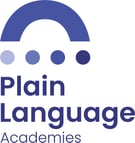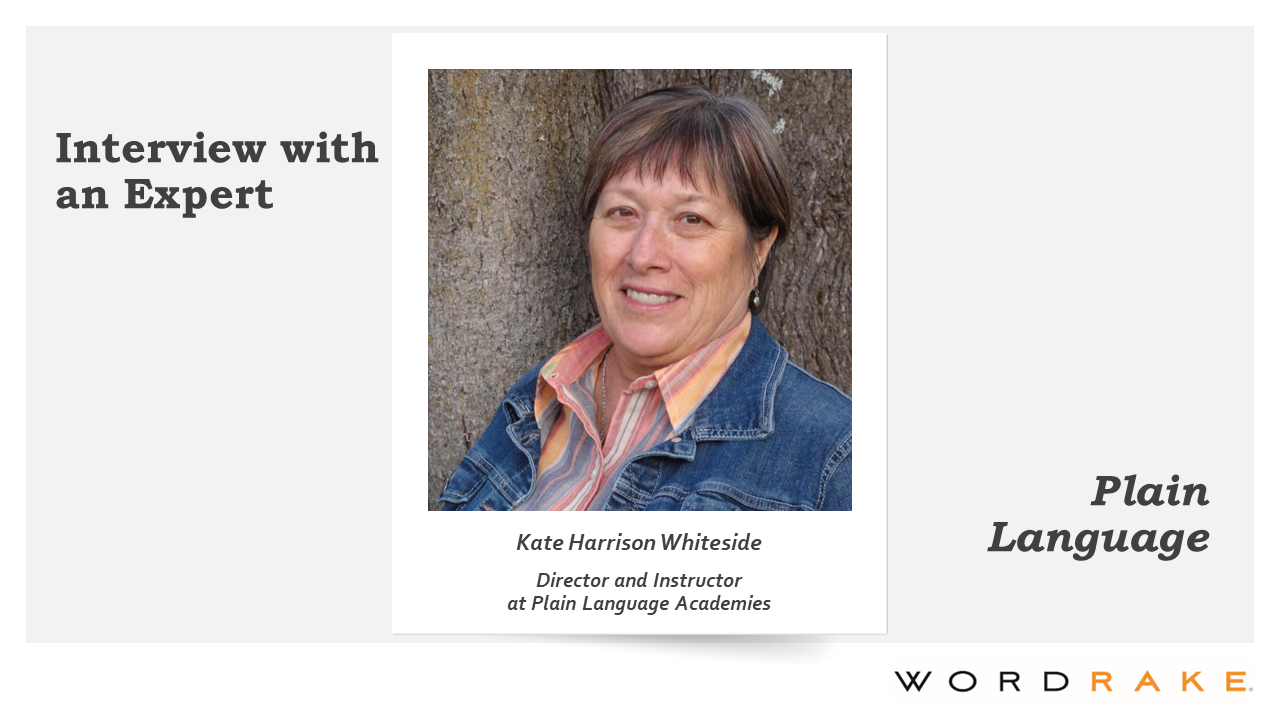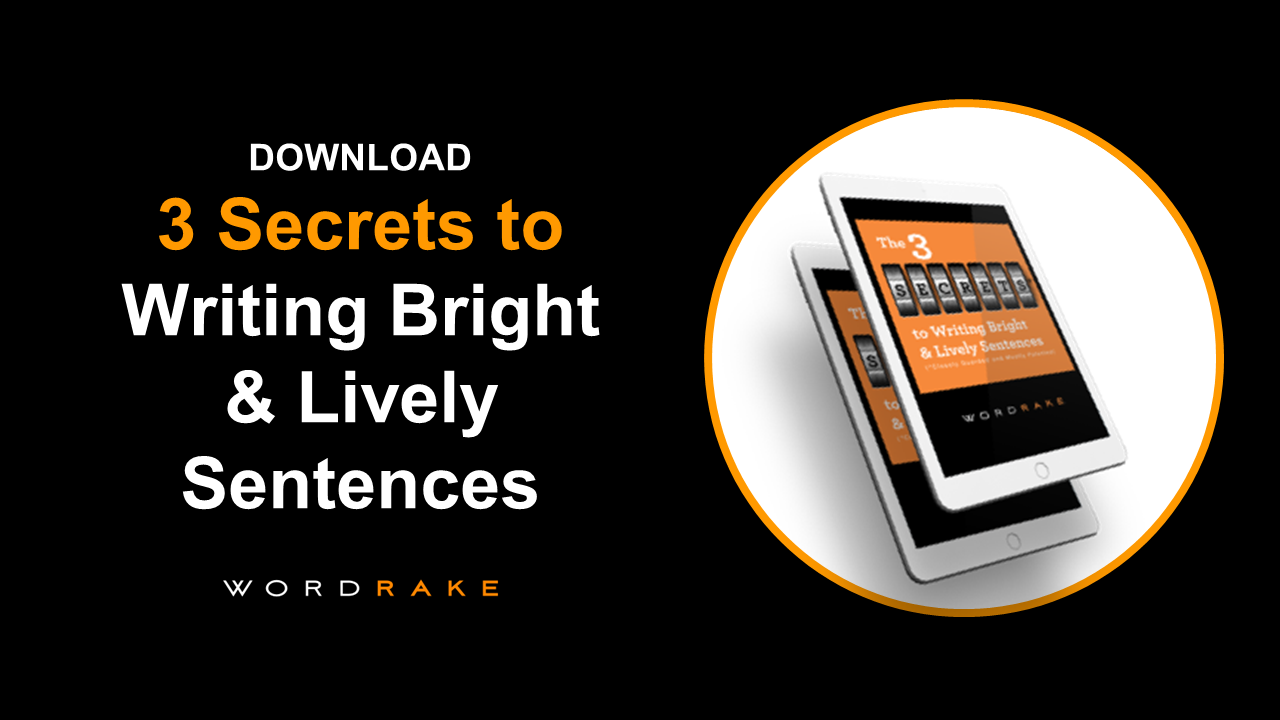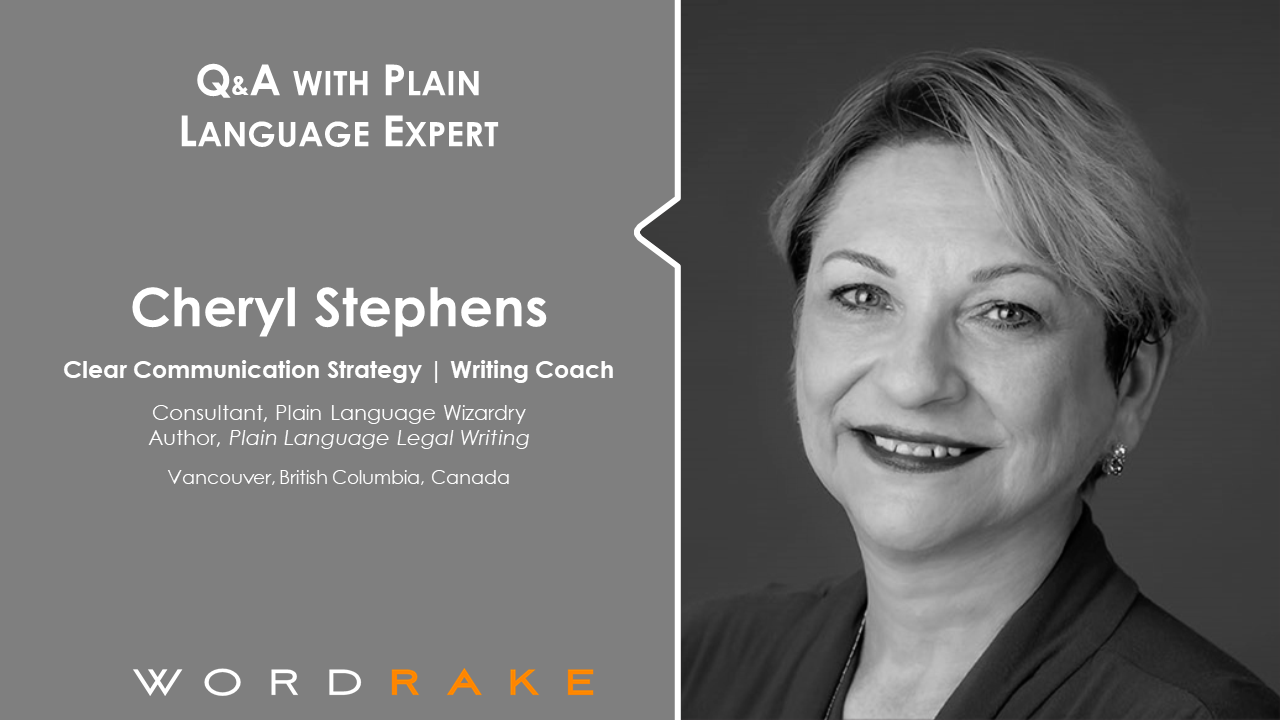Every year WordRake celebrates International Plain Language Day by talking to experts and sharing some of their wisdom on our blog. Today we’re interviewing plain language expert and instructor Kate Harrison Whiteside, one of the fantastic founders of the holiday, about her passion for clear communication.
What is your role and how is it connected to plain language?
I currently wear several hats, and as a hat lover I am happy wearing them all. I am Director of and an instructor with the PlainLanguageAcademies.com. It’s been very exciting to grow with our online training platform to include French and Spanish academies, courses by South African plain language specialists and our students from around the globe.
How did you become interested in plain language?
I studied journalism where the focus was on audience and connecting. The writing style was short and to the point. We had to cover the 5 W’s (who, what, where, why, and when) in 25 words or less. In one of my early jobs, I worked simplifying technical information for the agriculture community during the switch from imperial to metric measurements. These all really put my focus on audience needs and clarity.
Plain language, even though I hadn’t met it by that name, became a key focus of my editing skills and services. One contract led me to simplifying a financial program form. It took every aspect of the plain language process, from audience assessment, editing, testing, and training, to get to our final goal. It required a revamp of documents, technology, processes, and people. I became fully immersed in and committed to plain language. I could see the benefits on so many levels.
What prompted you to found the Plain Language Academies?
When I looked at what plain language training was available, there wasn’t much. I was just going to put one of my courses online when Cheryl Stephens suggested we do courses for the whole process. So we set up six courses. At this time, plain language also became integrated into different sectors: health, finance, government, and law. So, I sought out training experts in these professions and current topics like design, accessibility, leadership, and added more courses to our program. Now we are looking at setting up in more geographic locations. As the Academy grows, so does my interest and commitment.
Does teaching about plain language change the way you think about it as a writer and editor?
Teaching about plain language for me is also about learning. Student’s raise interesting questions, submit intriguing assignments and share insightful links. All the time I am teaching, I am learning. One student with a disability has taught me so many things about accessibility. You can watch an interview with her on PlainLanguageAcademies.com. My colleagues and students with second languages have opened the doors to new learning opportunities and the global importance of clear communication. So my thinking about writing is fluid, but always has clarity as its base.
Why did you and Cheryl Stephens create Plain Language Association International (PLAIN)? How did you first connect with other plain language advocates around the world?
Cheryl and I met at a plain language event when she was working on a legal project and I was working on a financial one. I was so motivated to pursue this excellent concept for clear communication that I started talking to Cheryl about what we could do. At that time plain language practitioners were mostly independent contractors working on their own around the globe. The idea of the Plain Language Consultants Network was born.
Cheryl is excellent at networking and email had just become accessible. So we set up a conference in Winnipeg, where I was based, and had a very good national and international turnout. That demonstrated there really was a strong commitment to it. We followed up with another conference. We soon realized it was going to be an organization that needed committee leadership. So we passed it on in 2000 and PLAIN was born.
Where did you get the idea to create International Plain Language Day? How do you celebrate?
We felt that it was time to recognize people’s accomplishments. The practice and PLAIN had grown. The web was full of opportunities to share online. We just kept spreading the word and others followed. It is now in the hands of PLAIN and has even bigger participation. Showing and telling are powerful, especially before and after examples to promote and recruit supporters.
The ISO released Plain Language Standards last year. Why are these standards important?
The ISO standard took a lot of people a long time and a huge amount of dedication to become published. The commitment the development teams put into it has been rewarded with the interest, energy, and use from practitioners, organizations, and countries. It has initiated a new evolution for plain language. Having a universal standard, a shared definition, an identified functionality for it is such a strong point for all of us in the profession. It will help us promote, practice, and put it in motion more easily.
You are also a novelist. How does your background in plain language impact your fiction writing?
When I was studying at university, my English professor said my style of writing was more journalistic than academic. As an editor, while living in the UK, I explored writing fiction. Cumbria’s Lake District region was full of writers, being the home of Beatrix Potter, William Wordsworth, and a wide network of talented writers producing radio plays, poetry, and novels. I took a creative writing training series from a very generous author. I had a series of short stories commissioned by Woman’s Weekly magazine. That motivated me to look at writing a novel. It started out as a series of short stories about my grandmother, who emigrated to Canada in the early 1900s. These tales evolved into a fictional series of four novels, North, East, South, and West. North and East are self-published. The third is being proofed and the fourth is an idea. It is a completely new experience, especially self-publishing. Plain language showed me the importance of audience, clarity, and connecting.
What are some factors that indicate a need to write in plain language?
Ask your audience. Look at it from their perspective. Do it before you start writing. Readers are our most important asset. We should always invest time with them before we start, to really get the benefits. I think about them as a primary editing resource. Communication is about connecting and sharing: these can’t be effectively achieved without a strong relationship and empathy with our audiences. Communication starts and succeeds with them. If you and your audience aren’t getting results, plain language is probably the solution to your problem.
About the Author
 The best aspect of being a writer is not knowing exactly where words will take you. Kate Harrison Whiteside’s path started in journalism, landed in government communications, moved to consulting and continued with training. Now it includes all these, with the focus on plain language.
The best aspect of being a writer is not knowing exactly where words will take you. Kate Harrison Whiteside’s path started in journalism, landed in government communications, moved to consulting and continued with training. Now it includes all these, with the focus on plain language.
She wears a lot of hats: co-founder of the Plain Language Association International (PLAIN), International Plain Language Day, and director of the Plain Language Academies. In 2021, they won the Cheryl Stephens Innovation Award for outstanding accomplishments in innovation.
Plain language knows no boundaries: professionally, culturally, geographically. And this is represented in Kate’s varied clients, services and projects.
Her words and work are inspired by happy plain language clients and readers who benefit from, apply, share and enjoy them. Just for fun, Kate has written and published the first two novels in her four-part series, North Under the Waves, East Into the Mist; South and West coming. You can reach her at Kate@PlainLanguageAcademy.Com
About WordRake and International Plain Language Day
Plain Language experts Cheryl Stephens and Kate Harrison Whiteside created International Plain Language Day on October 13, 2011 to celebrate the first anniversary of the signing of the Plain Language Act in the United States. Since then, plain language enthusiasts take time each year to celebrate the gains the movement has made.
In October 2022, WordRake celebrated Plain Language Day by releasing their new Simplicity editing mode to help comply with plain language laws. As firm believers in the importance of clear communication, WordRake celebrates October 13th by highlighting experts and leaders in the plain language field. To see how WordRake can help you simplify your writing, take a 7-day free trial today!










